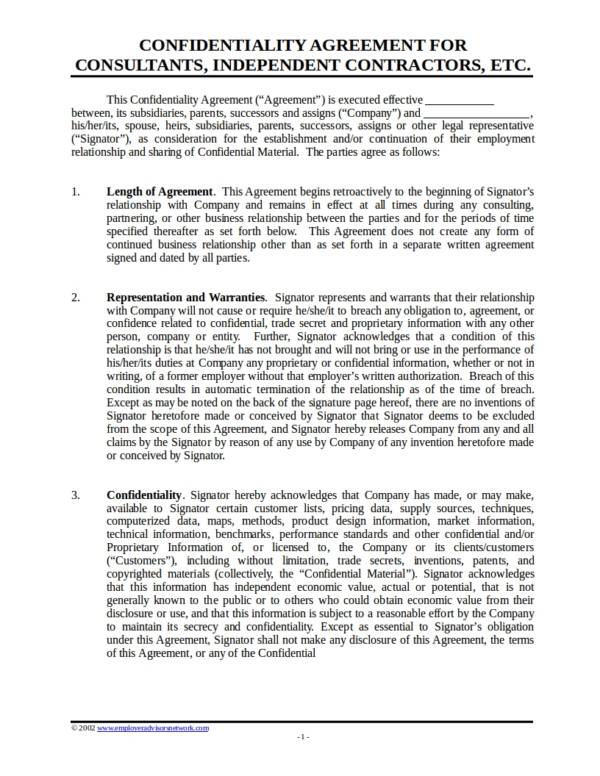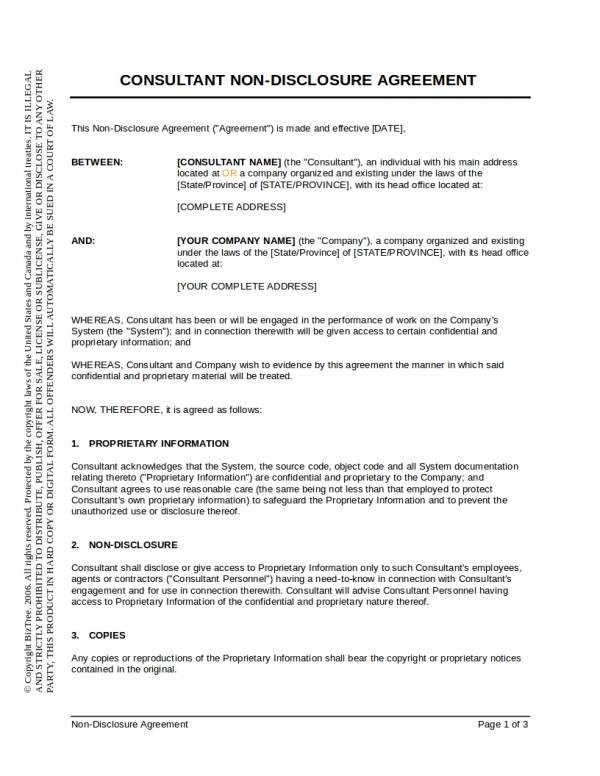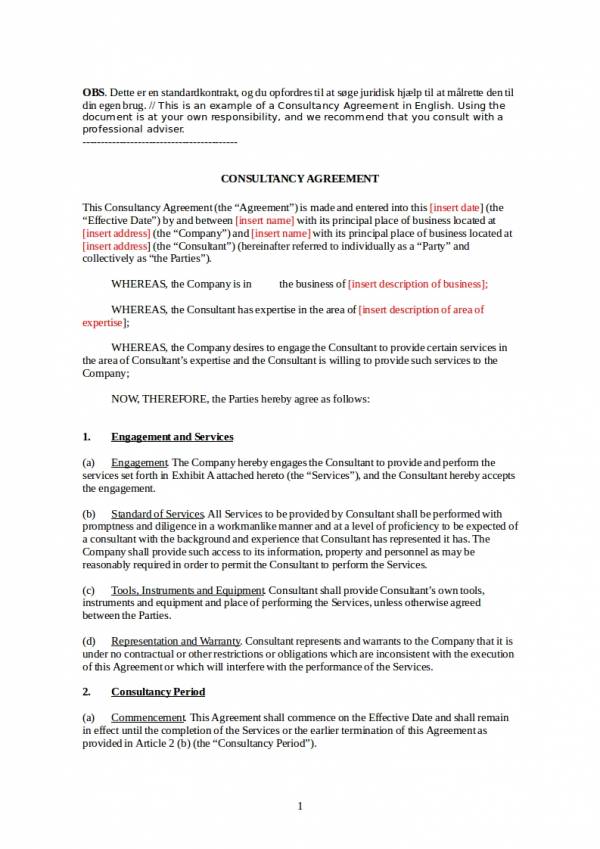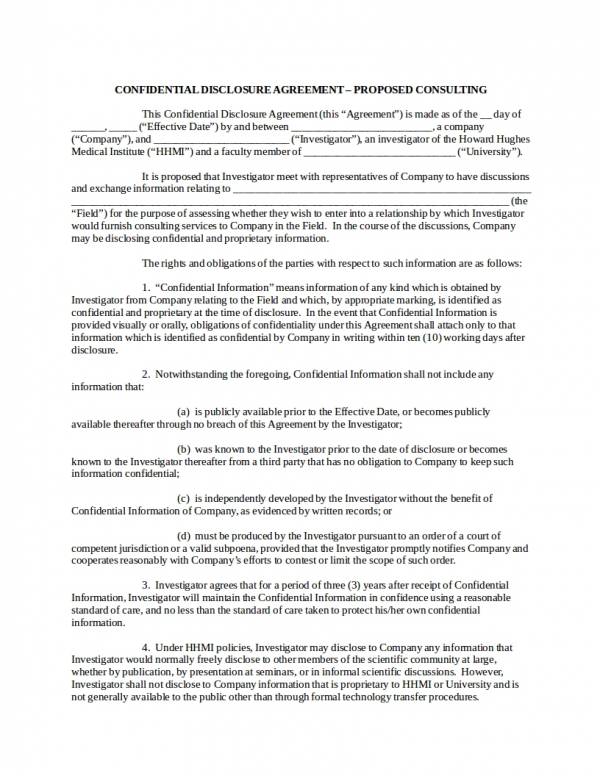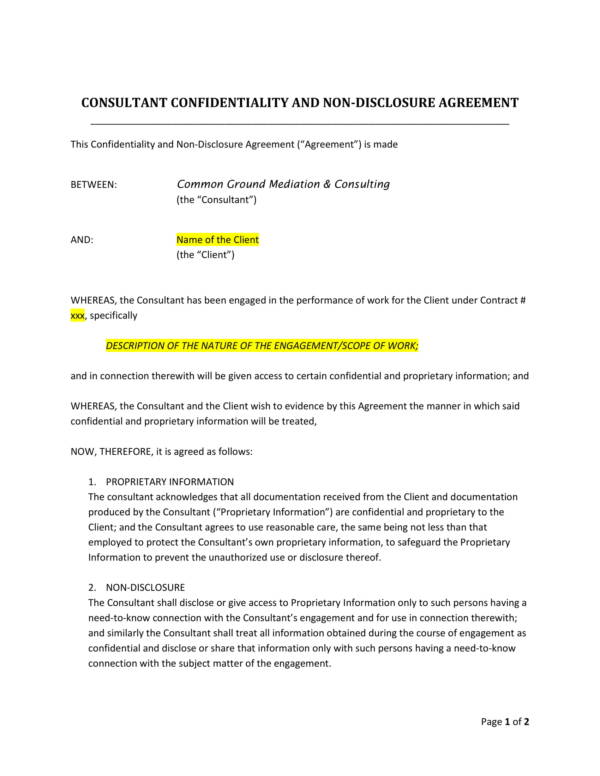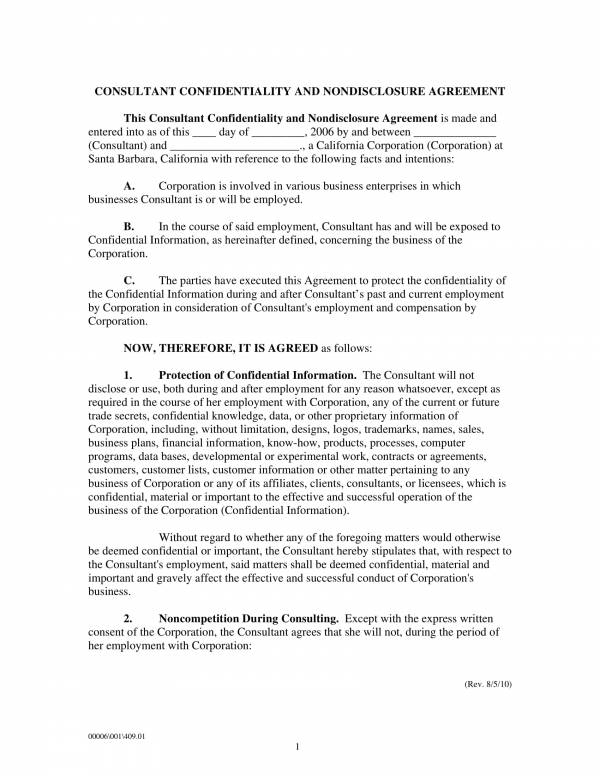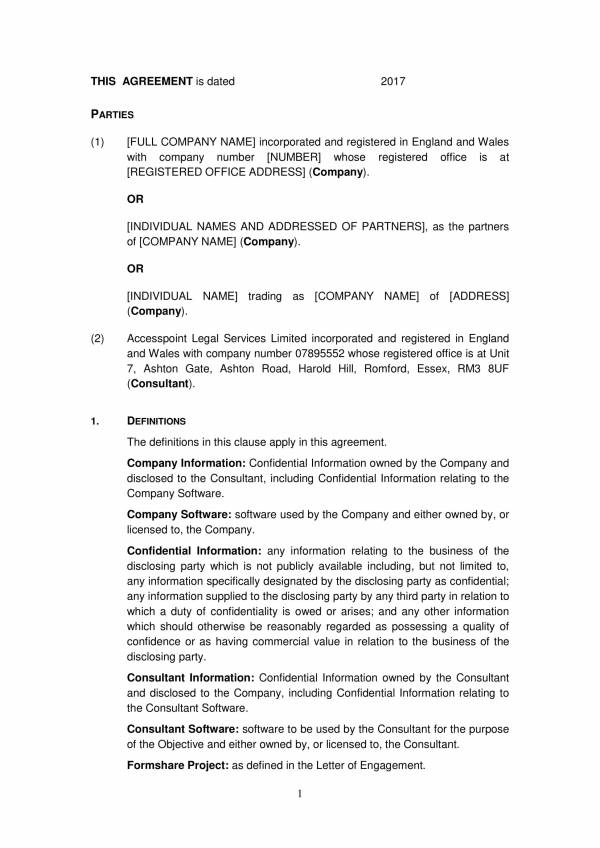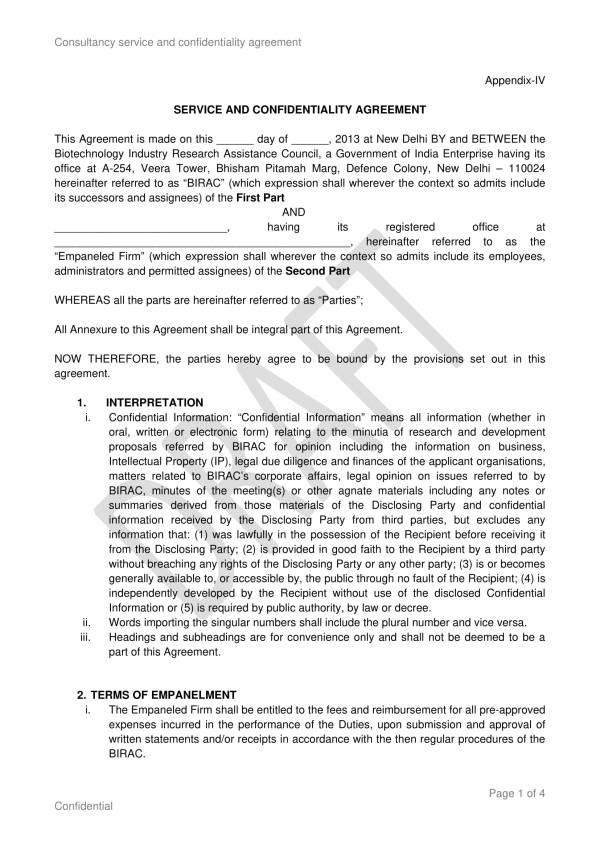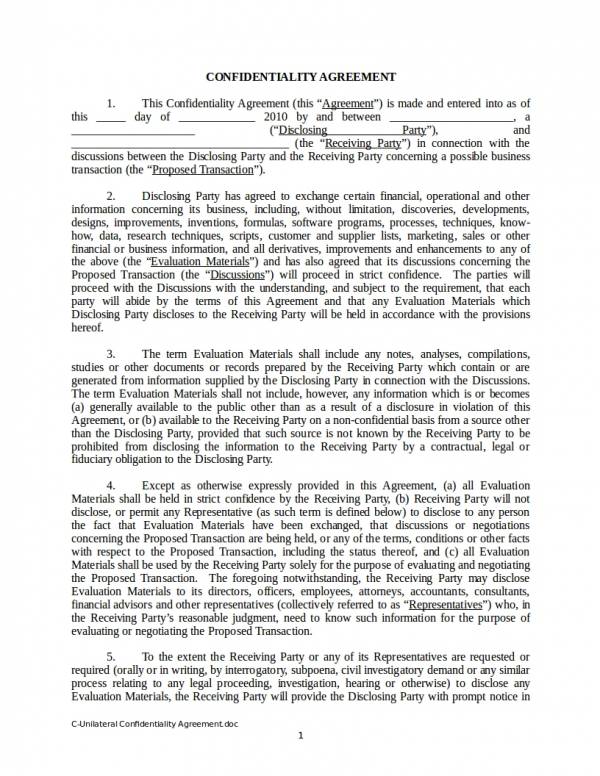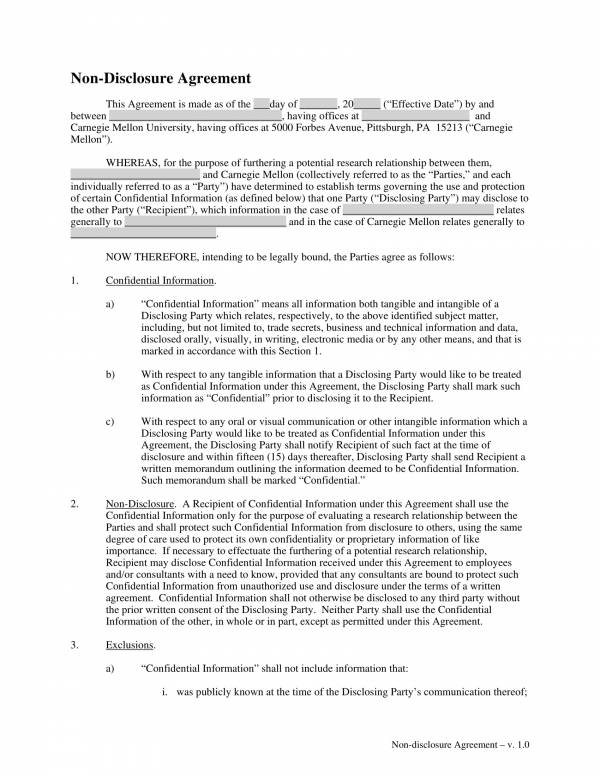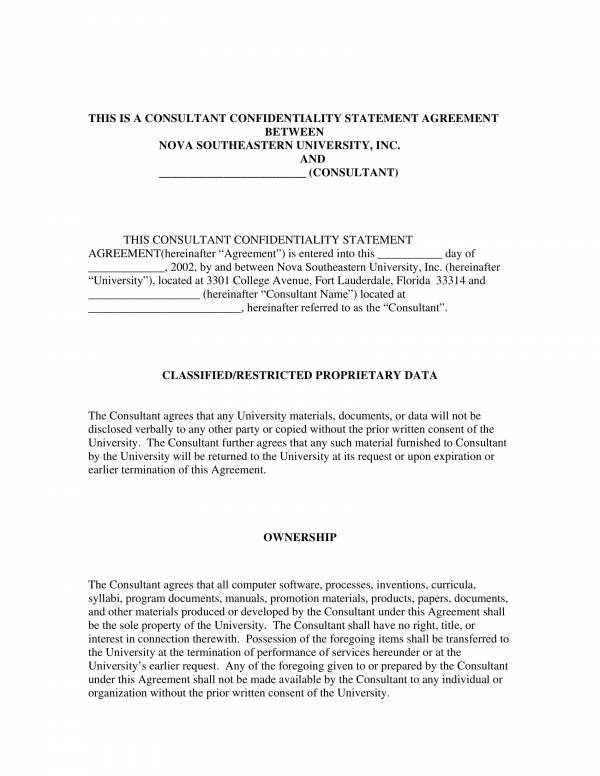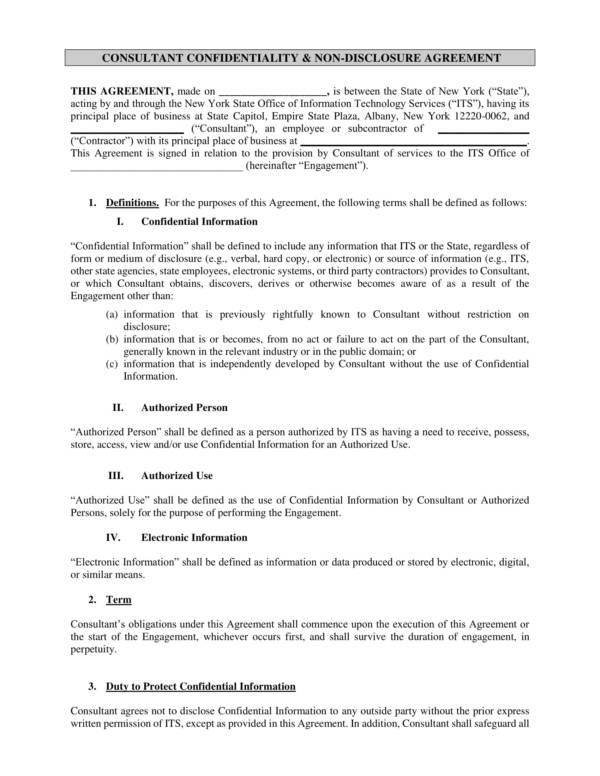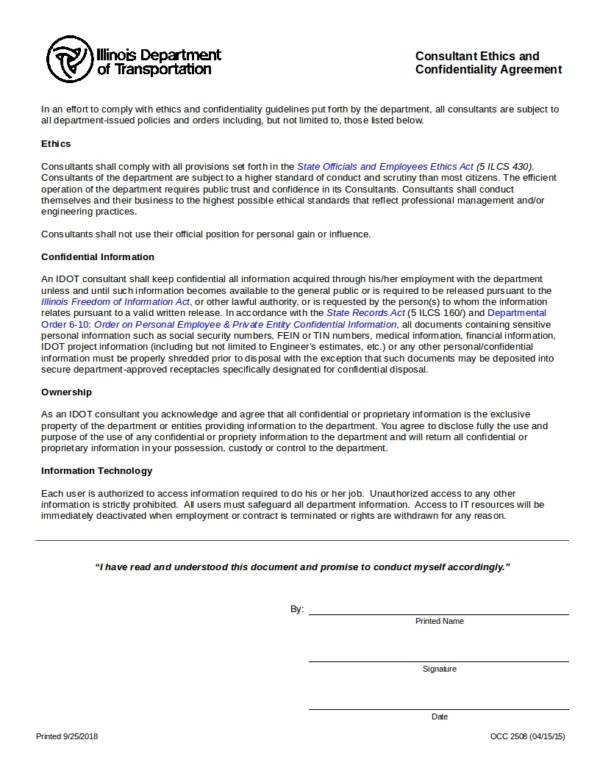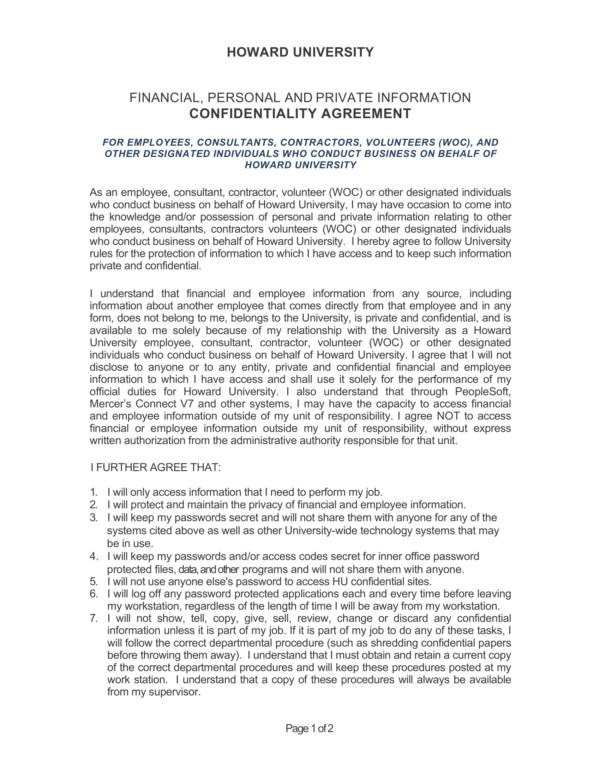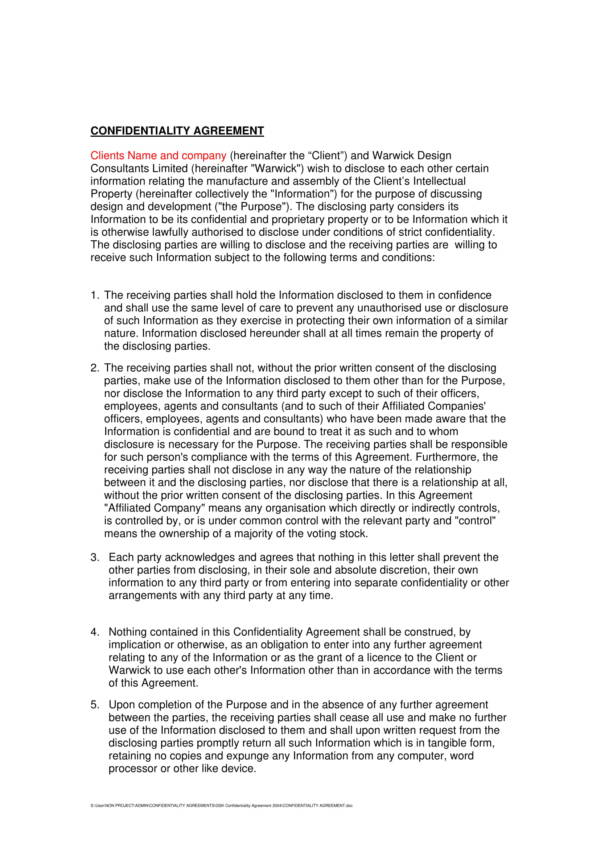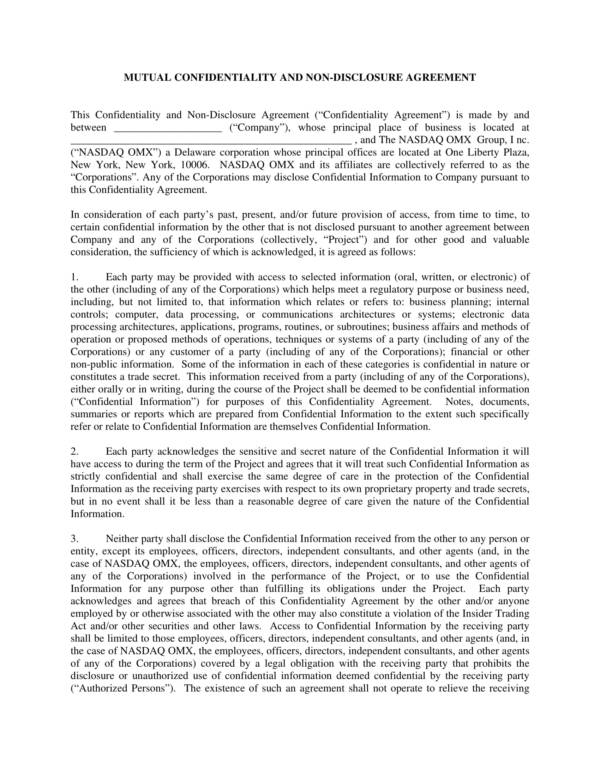An agreement is defined as an arrangement between two or more individuals or parties who agree and have the same thoughts about something. A meeting of the minds actually take place when an agreement is offered by one party and then accepted by another. This means that both can start a discussion where consent from both parties are given.
There are many forms and types of agreements, and they are often mostly used on formal businesses and legal transactions. One of the many agreement types is a confidentiality agreement for consultants. Businesses or companies who seek the help and expertise of consultants need to have a confidentiality agreement in place for their protection. Check out the samples and templates that we have prepared here just for you.
Confidentiality Agreement Sample for Consultants
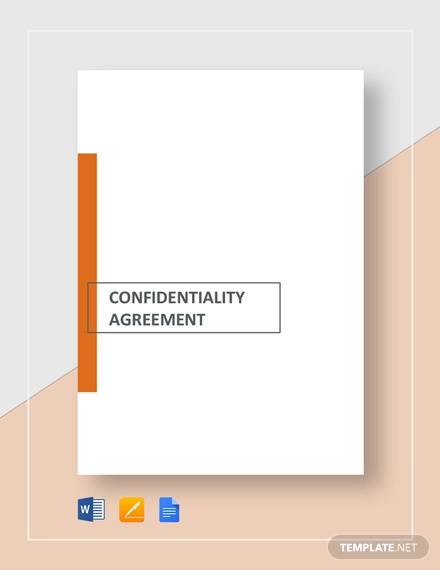
Basic Confidentiality Agreement Sample Template
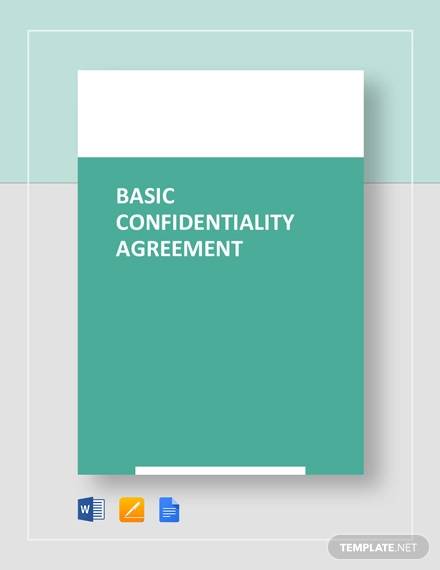
Restaurant Confidentiality Agreement Template
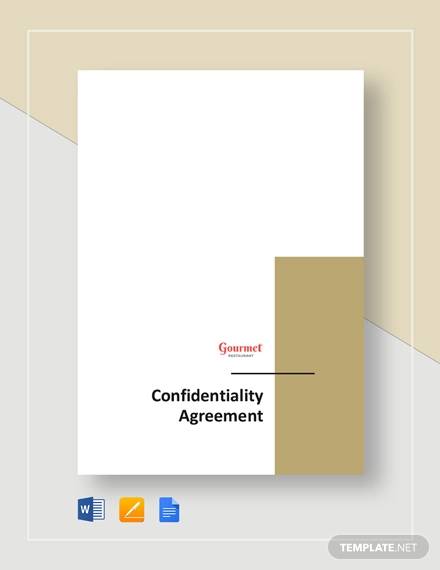
Data Processing Services Confidentiality Agreement Template
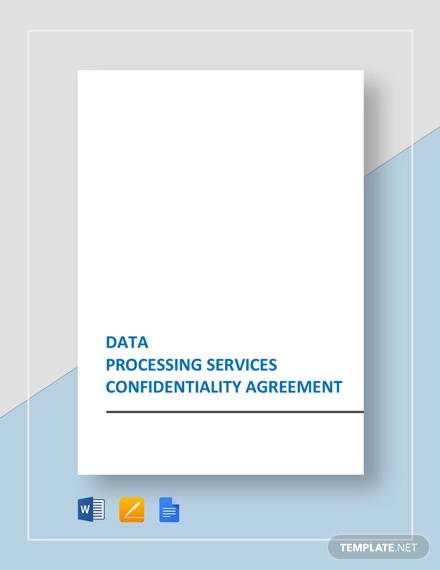
Customer Confidentiality Agreement Template
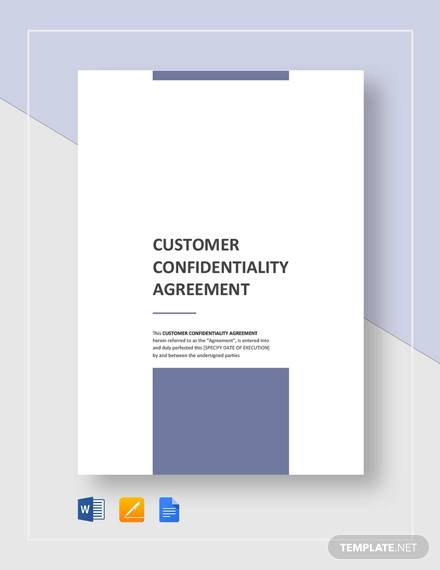
Confidential Information Agreement Template
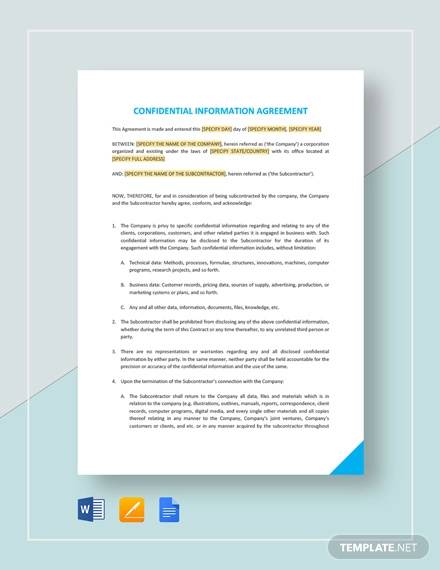
Employment Confidentiality Agreement Template
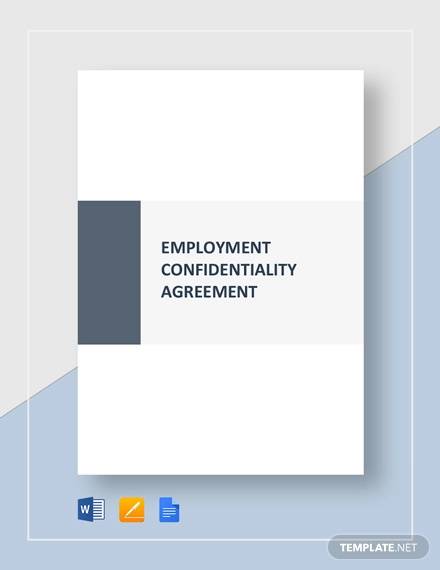
HR Confidentiality Agreement Template
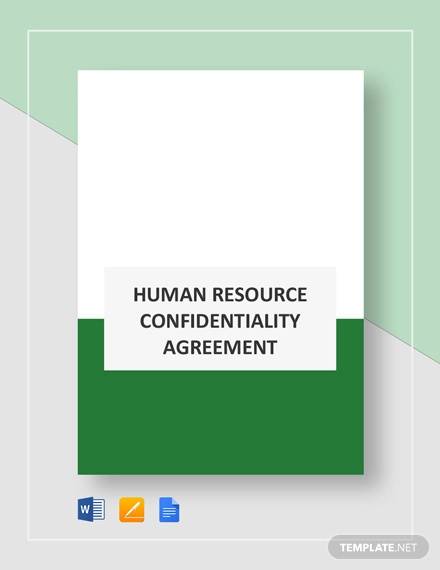
Church Confidentiality Agreement Template
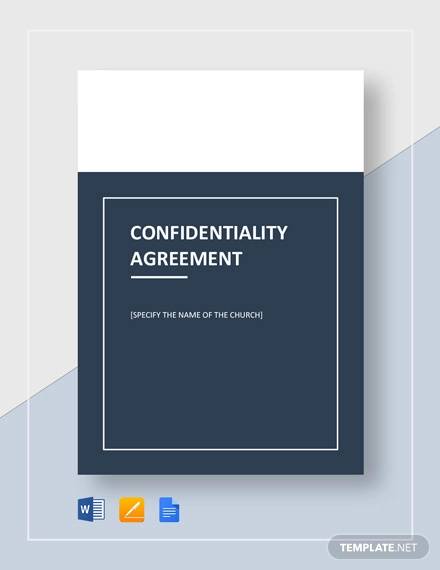
Confidentiality Agreement for Consultants
Consultant Confidentiality and Non Disclosure Agreement
Consulting Agreement
Confidential Disclosure Agreement – Proposed Consulting
Sample Consultant Confidentiality Agreement Template
Generic Consultant Confidentiality and NDA Agreement
Consultant Non Disclosure Agreement Template
Consultancy Service and Confidentiality Agreement
What Is a Confidentiality Agreement for Consultants?
A confidentiality agreement, also known as a non-disclosure agreement or NDA, is an agreement where both parties promise to keep certain information, especially sensitive information, secret or well out of reach of outsiders or third party entities.
Since a verbal promises are meant to be broken and leaves both party without any proof that the arrangement took place, a written promise such as a confidentiality agreement is put in place. In order for the agreement to be truly effective, all the parties who are involved in it must understand and agree to all the terms and conditions provided in it. A confidentiality agreement is also referred to as confidential disclosure agreement or CDA, proprietary information agreement or PIA, and secrecy agreement or SA.
Consultants know a great deal of information form various clients regardless of the industry they are under. There are consultants in business, law, health and many other fields that are hired to help in making decisions and giving advice on what one should and should not do in a certain situation or case.
They are made aware of the scenario before they can provide the needed help, and that includes secrets that should not and must not be divulged. This is where the use of a confidentiality agreement comes into place. The agreement binds all of the parties involved in it to the set terms and conditions, and are obliged to never speak of it to anyone outside the involved group or they will have to face certain consequences.
There are also other types of agreement that you may want to check out, like Sample Real Estate Confidentiality Agreements, Medical Confidentiality Agreements, and Client Confidentiality Agreements.
Uses of a Confidentiality Agreement
A lot of transactions may well be left unacknowledged or unknown without a confidentiality agreement, and we may still be using verbal agreements or promises up to this date. I think that is a bit unreliable, especially when it comes to handling extremely confidential and sensitive information. That is why a lot of entities resort to using confidentiality agreements. So here are some of the uses of a confidentiality agreement that you should know.
- The primary use of a confidentiality agreement is bind all the parties involved in it and oblige them to not disclose or tell anyone about the the agreed upon information other than those involved in the agreement. This is to keep the said information confidential, especially if it is something personal or about trade secrets.
- A confidentiality agreement is used so that the information disclosed can only be used for specific purposes or for purposes enumerated in the agreement.
- It is used to ensure that only the people who are involved should know about the confidential information.
- The agreement will be a document used to record everything that has been discussed and agreed on by all the involved parties. They become the terms and conditions of the agreement which everyone is obliged to follow.
- It is used as proof or evidence that the said transaction took place. It is very useful if the situation or case is brought to court as a legal evidence.
- A confidentiality agreement provides a list of the agreement breaches and remedies on how these breaches can be resolved before they can finally go to court. These remedies, include corresponding payment for the damages brought about by the breach and providing the reasonable demands of the non breaching party.
Confidentiality agreements are pretty useful, especially when it comes to securing important and confidential information. Of course, no secret can be kept forever so one of the aims of having the agreement in place is to minimize the number of people who knows about it. You may also check out other useful articles, like Volunteer Confidentiality Agreements and Mutual Confidentiality Agreements.
Can a Confidentiality Agreement Last Forever?
There is what we call a term clause in a confidential agreement, which sets or states how long the agreement should last. In every confidential agreement, there will always be a disclosing party and a receiving party and the benefits of this clause depends on what your role is in the agreement.
If you are the disclosing party, you want to protect your information for as long as possible and protect it from any unauthorized disclosures that may potentially take place some time in the future. If you are the receiving party, you also want to know how long you need to keep the information confidential and limit your obligations in the agreement as best as you can.
Most confidential agreements lasts an average of 2 to 4 years depending on the agreed arrangement by the involved parties. After the stated expiration date, the receiving party will no longer be bound or obliged to keep the information confidential. However, if the confidential information is a trade secret then the circumstances may vary. But this does not entirely mean that confidentiality agreements does not last forever.
If a confidentiality agreement does not include a term clause in it, then this means that the agreement will be indefinite or has no end. This type of confidential agreement is more commonly used in ongoing transactions or with relationships that are still taking place. Although this is allowed, there are some states that see this as unreasonable and may be found unenforceable in court. Another reason is that it can cause unreasonable trade restraints.
So can a confidentiality agreement last forever? Well, it is both a yes and a no. It is important to know these details about confidential agreement. If you also would like to know more about agreements and free samples and templates, you may visit our website anytime. Some of the titles that you will find interesting are Legal Confidentiality Agreements and Sample Business Confidentiality Agreements.
General Types of Confidentiality Agreements
There are three general types of a confidentiality agreement and they are unilateral, bilateral and multi lateral confidentiality agreement. Each of these types are briefly discussed below.
Unilateral Confidentiality Agreement
In a unilateral type of confidentiality agreement, there are two parties involved but only one party discloses information and the other party receives it. This agreements done to ensure that the information is not further disclosed. Examples of its use is limit the exposure of the information before a press release, protect trade secrets and maintaining secrecy that will satisfy patent laws.
Bilateral Confidentiality Agreement
Two parties are still involved in a bilateral confidentiality agreement, but unlike the unilateral confidentiality agreement, both parties anticipates disclosing information to another that they both must protect from further disclosure. This type of agreement is common in businesses who plan to start a joint business venture. Also, some parties may insist on a bilateral confidentiality agreement, instead of a unilateral confidentiality agreement even if only one party is anticipated to disclose information. This is done to make the agreement more fair and balanced and with the possibility of the both parties may need to disclose some information at a later time.
Multilateral Confidentiality Agreement
A multilateral confidentiality agreement eliminates the need for separate unilateral and bilateral confidentiality agreements because instead of having only two parties involved, it allows two or more parties in the agreement. In this set up, one party is anticipated to disclose confidential information while the other parties are expected to protect the information from getting further disclosed.
The advantage of this type of confidentiality agreement is that all parties only need to review, implement and execute one agreement. The disadvantage is that it may take complex negotiations for all the parties to agree on certain provisions.
It is important to have knowledge about the different general types of confidentiality agreement as this will give them an idea on the type of agreement they should be joining in certain transactions which can eventually keep them out of trouble. You may also want to check out other related articles, like Patient Confidentiality Agreements, Lease Agreements in PDF, and HR Agreements Samples & Templates.
What Types of Information Are Considered Confidential?
We have been talking about keeping information confidential, but do we even know what information is considered confidential? To give you an idea of what information are considered confidential, we have prepared a list of them below.
- Names, date of birth, age, sex and address are considered confidential information as they can be used in fraudulent activities or in identify theft, where another person steals the identity of another and does transactions that can put them in trouble.
- Contact details should also be kept confidential to prevent being a victim of any phone call scams and prevent your call history and details to be accessed by another. In some cases, ones’ phone number is used as a security information to be able to make changes to their utility accounts and that is not good.
- You should also not share any details about your family and that includes their contact details, too.
- Bank details should never be shared and those who work in banks need to maintain extreme confidentiality regarding the accounts of all their clients.
- The medical history or records in hospital can only be accessed by medical professionals who are directly in charge or are taking care of that patient. Their health condition, regardless if they are healthy, should not be disclosed to other people without due process, even if they are family.
- Other service records and one’s personal progress notes should also not be shared with anyone else.
- Assessments or reports from work or school should only be issued to the owner or their representative with their consent because it is also considered confidential information.
- Other information that are considered confidential, include individual personal plans, orders for guardianship and both outgoing and incoming personal correspondence.
It is best to be mindful about the information that we provide or offer to other people. Knowing what information to keep to ourselves and what type of information we can freely share will help us avoid unwanted incidents and problems. Other types of agreements you may be interested in are Investment Agreements Samples & Templates and Transfer Agreements.
Situations Where You May Want to Use A Confidentiality Agreement
Not all transactions require a confidentiality agreement, but it pays to know which transactions you will need to have one in place. We have gathered here a list of the the situations where you may want to use a confidentiality agreement.
- When you are sharing financial information, marketing information and other essential information to any prospective buyer.
- In situation get access to sensitive company information as part of their job.
- When you get into a business partnership or joint business venture with another business or company.
- When you hire the services from another company or business that involves or allows them to access confidential information about your company or business.
- Showing new products or technology to prospective buyers.
- Presenting inventions, manuscripts, original artwork and other business ideas to potential business partners.
Unilateral Confidentiality Agreement
Sample Template for Non-Disclosure Agreement
Consultant Confidentiality Statement Agreement Template
Printable Confidentiality and Non Disclosure Agreement
Consultant Ethics and Confidentiality Agreement
Sample University Confidentiality Agreement
Consulting Company Sample Confidentiality Agreement Template
Standard Mutual Non Disclosure Agreement Sample
Importance of A Confidentiality Agreement
The following are the reasons why a confidentiality agreement is important.
- Trust – The presence of this document in any business transaction helps establish a trusting relationship between the parties involved in the said transaction. If each party trust each other, then they can gain each other’s respect.
- Security – It gives the feeling of security to all the parties involved as they know that the other party will fulfill their part of the agreement and that they will have to face consequences if they fail to perform.
- Legalities – An agreement such as a confidentiality agreement indicates that the transaction is legal and that it is enforceable in the court of law. It is also legally binding.
- Obligations – Since it is legally binding, all the parties who are involved in it are obliged to follow the agreed upon the terms and conditions stated therein.
- Proof or evidence – The document serves as proof or evidence that the transaction took place and that all the parties who are involved in it agree to what has been written.
- Consent – Once the agreement has been signed, it means that the party who signed it provide their consent to be part of the agreement and be obligated to follow its terms and conditions.
We hope that you are able to learn something about confidentiality agreements and agreements. To be able to download free samples and templates of other forms of agreements, you may visit our website anytime. Some of the articles that we offer there are Release Agreements and Exchange Agreements.
Related Posts
FREE 10+ Mentoring Agreement Samples In MS Word | Apple Pages | PDF
FREE 10+ Partner Agreement Samples In MS Word | Google Docs | Apple Pages | PDF
FREE 10+ Individual Agreement Samples In MS Word | Google Docs | Apple Pages | PDF
FREE 10+ Strategic Agreement Samples In MS Word | Google Docs | Apple Pages | PDF
FREE 10+ Equity Agreement Samples In MS Word | Google Docs | Apple Pages | PDF
FREE 10+ Producer Agreement Samples in MS Word | Apple Pages | PDF
FREE 10+ Grant Agreement Samples In MS Word | Apple Pages | PDF
FREE 8+ Meeting Agreement Samples in MS Word | Google Docs | Apple Pages | PDF
FREE 10+ Community Agreement Samples In MS Word | Google Docs | PDF
FREE 8+ Real Estate Option Agreement Samples in MS Word | PDF
FREE 10+ Call Option Agreement Samples In MS Word | PDF
FREE 10+ Advertising Agreement Samples In MS Word | Google Docs | Apple Pages | PDF
FREE 10+ Car Agreement Samples In MS Word | Google Docs | Apple Pages | PDF
FREE 10+ Horse Agreement Samples In MS Word | Apple Pages | PDF
FREE 10+ Option Agreement Samples In MS Word | Google Docs | Apple Pages | PDF

